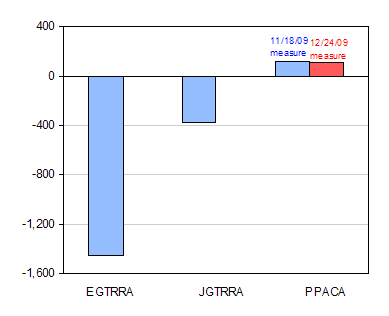And a quantitative comparison to previous reconciliation measures.
The CBO and the Congressional Joint Committee on Taxation (JCT) have updated cost estimates for H.R. 3590, the Patient Protection and Affordable Care Act (PPACA), as it was passed by the Senate on December 24, 2009. The figures are here. I’ve incorporated the new estimates into the bar chart first reported in this March 1st post.
The first bar is the impact on the unified budget balance of the Economic Growth and Tax Relief Reconciliation Act (EGTRRA) of 2001. The second is the impact on the budget balance of the Jobs and Growth Tax Relief Reconciliation Act (JGTRRA) of 2003. The third blue bar is the CBO estimated impact on the unified budget balance of the Patient Protection and Affordable Care Act proposed in the Senate on November 19, for 2010-2019; the red bar is the estimated impact on the budget balance for the measure passed December 24th.

Figure 1: Impact on budget balance, in billions of FY2010$, for EGTRRA; for JGTRRA; and for Patient Protection and Affordable Care Act. Source: CBO, Budget and Economic Outlook: An Update (August. 2001), Table 1-4; CBO, Budget and Economic Outlook: An Update (August 2003), Table 1-8 (revenue implications only); CBO,
“Patient Protection and Affordable Care Act: Cost estimate for the amendment in the nature of a substitute to H.R. 3590, as proposed in the Senate on November 18, 2009”; and CBO, “Cost estimate of H.R. 3590, the Patient Protection and Affordable Care Act (PPACA), as it was passed by the Senate on December 24, 2009”.
Note that I used the CPI-all to convert to FY2010$. I used the CBO’s January 2010 forecasts for calendar year CPI year-on-year inflation rates for 2010 and 2011, and projections for 2012-2019, as reported in the CBO, Budget and Economic Outlook, Fiscal Years 2010-2020 (January 2010).
menzie: you can make all the arguments you want for govt spending but the facts keep getting in your way. Increase minimum wage? Now a noted economist estimates it cost 500k jobs. Not coming back. Increase transfer payments for “middle class”? Now more than 1/3 of tax filers pay no tax per IRS. Claim healthcare system does not incentivize savings because 3rd party payor. Now 1/3 of people have no incentive to rein in govt spending. Govt can not produce as well as private sector. We will now have people permanently on govt payroll. I hope you do not have children.
This will be worse than Carter years.
How do CBO projections for Medicare and Medicaid compare to the actual costs of those programs? Also, how should one respond to the statements made by Paul Ryan during the Health care summit?
http://www.youtube.com/watch?v=zPxMZ1WdINs
I agree, everyone should review Paul Ryan’s statements. I think the problems he identifies are behind much of America’s skepticism regarding Obama’s claims that Obamacare will not raise the deficit one dime. Move nearly $400 billion of Obamacare related spending (‘doc fix’) out of the fill so that the bill is ‘budget neutral’. Count $.5 trillion of medicare ‘savings’ to offset Obamacare spending while Medicare is already paying out more than it brings in. Why not use medicare savings to shore up medicare? It’s lunacy to base conclusions of any sort on the CBO numbers. Noble cause, but poorly timed and poorly executed. Fix the economy, fix existing entitlements, then America will be more open to fixing health care.
I simply do not believe the estimates. As Alex B. notes, recall the original estimates for medicaid. And counting medicaid savings is fraud. That program is unustainable in its current form, so its savings should be used to salvage it, not to justify further increases in medical aid spending. The end may be justified, but we need to own up to the basic truths in our budget now, not pretend that further expansions won’t worsen the problem.
Professor Chinn,
I have a similar question to Alex. How does a place like the CBO still have credit? I understand that it is bi-partisan, but it continually gets its estimates wrong, and not by a little, but by a lot.
A couple of thought questions for you:
How would CBO score an increase in all tax rates to 90%?
How would CBO score a total ceasing of services for 12 months with no decrease in taxes?
don, Alex B, Tom Long: CBO is required to forecast/project under current law, or score under proposed law. The eventual costs of various programs deviated from these scores in part because of changes to the programs due to subsequent legislation. So the prediction errors are a composite of misestimate in the usual sense, and in failures to predict future legislation. I do not see how one can overcome the issue of the second component. After all, my guesses about future legislation likely differ from yours, which seem to incorporate some high speed trip down “The Road the Serfdom”. By the way, if you care to look at statistics (as opposed to merely stating talking points), you should look at the various studies comparing OMB, CBO and private sector forecasts of GDP…and see if you want to still make your stark assertions about CBO forecasting.
The CBO is highly reputable. I do not think any one is calling into question their methods. Everyone knows that they score what they are given. The question is and always has been, what are they given?